The Đám Hỏi Tradition: Our Vietnamese Engagement Party – Color & Chic
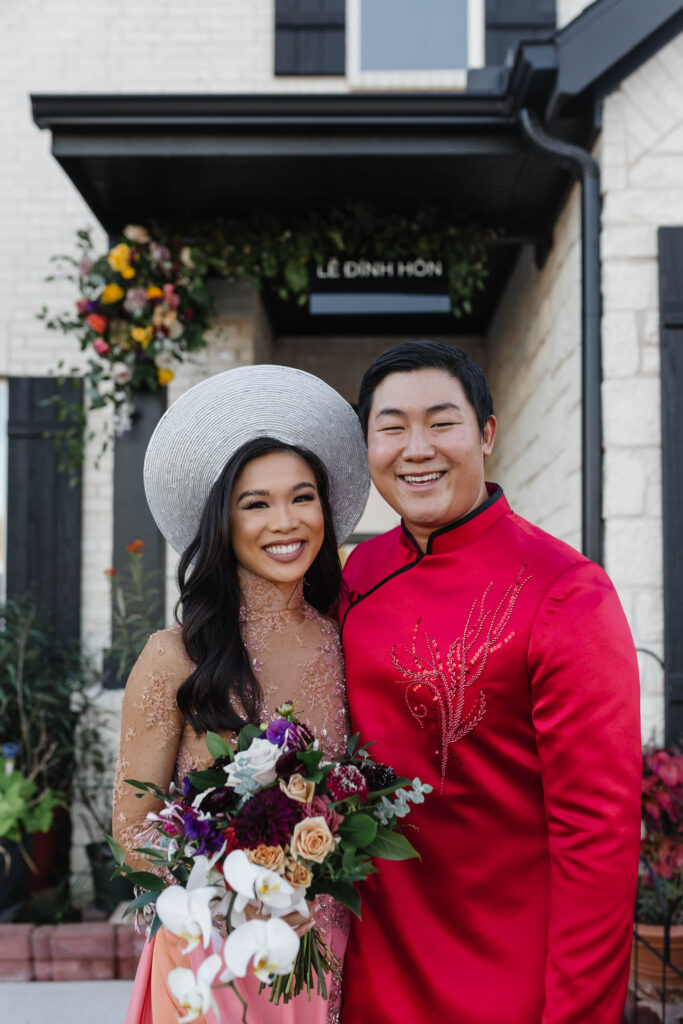
We can officially call each other’s parents Mom and Dad now! We had our Đám Hỏi a Vietnamese Engagement Party and it was so wonderful to be surrounded by family and friends. As we prepare for our wedding there are a couple of very important traditions in Vietnamese culture. Although we in America, it’s important for us to honor these cultural traditions. My parents have always said, “We don’t live in Vietnam. Vietnam lives in us.” The Đám Hỏ Tradition is more commonly known, but I had a lot of learning to do.
I’m excited to share what the Đám Hỏi entails, how you can prepare, what you need to honor and how you can modernize a few details to make it personal to you! I know for us, one of the tricky parts was making sure we respect and honor the tradition while putting our own spin on it. I hope this helps future couples and wedding parties who are hoping to have one, too. I’ll go over the preparation, the decor and the actual ceremony.

Turn on your JavaScript to view content
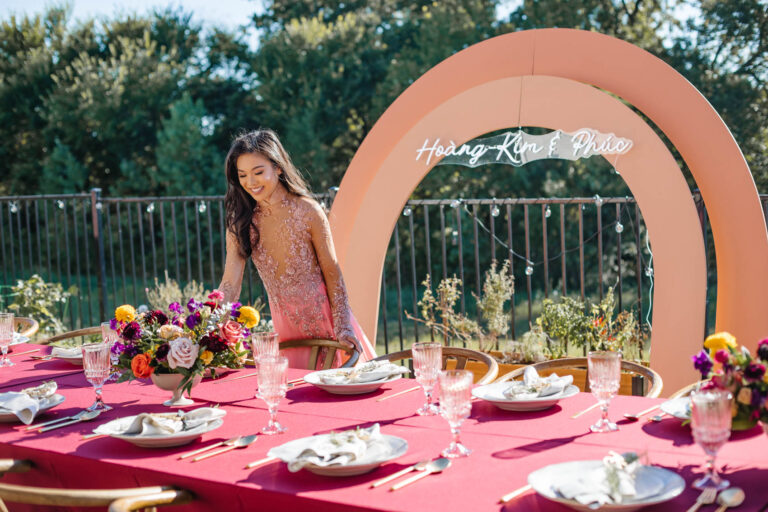
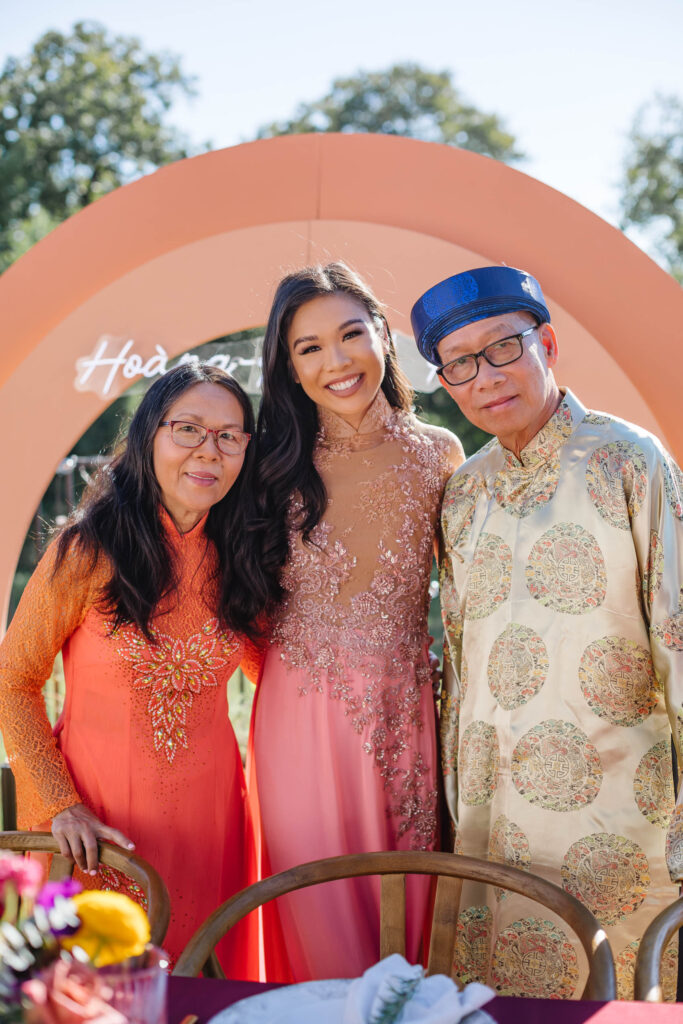
Mục Lục
The History of Vietnamese Courtship
It wasn’t too many generations ago when parents arranged marriages for their children. My Mom’s parents were actually the first in their small village to marry truly for love. There are three parts to a Vietnamese courtship, which also are the three ceremonies or parties.
Dam Ngo
Traditionally, this is when parents meet to discuss the possibility of their children’s courtship. The boy’s family will bring gifts to the girl’s family and ask for permission for them to start dating and getting to know one another. However, nowadays the couple will meet, then they meet the parents and with their approval, there is a proposal. Usually, this is when families will have a Dam Ngo.
For my parents, and for us, it was important to have all the necessary ceremonies. Our parents didn’t get the luxury of doing this since it was right after the Vietnam War and they didn’t have any money. We wanted to be able to have these traditions so we can share them with our future children and do the same for them.
About a month after Johnny proposed on ice in Central Park, we had our Dam Ngo and kept it between only our immediate families.
Đám Hỏi
The Đám Hỏi Tradition is the Vietnamese Engagement Party, which is when the parents announce the couple are getting married. It starts off with the groom’s family preparing and bringing gifts to the bride’s family (more on this below). Once there, they will ask for permission for their son to marry the daughter. Steeped in tradition, there is incense, asking for ancestors’ blessings and the ceremony concludes with the bride’s family announcing the wedding date.
Le Ruoc Dau
The final installment in Vietnamese courtship. This happens the morning of the wedding and when the groom comes to get his bride. I’ll be sure to write up a blog post on this after our wedding next year!
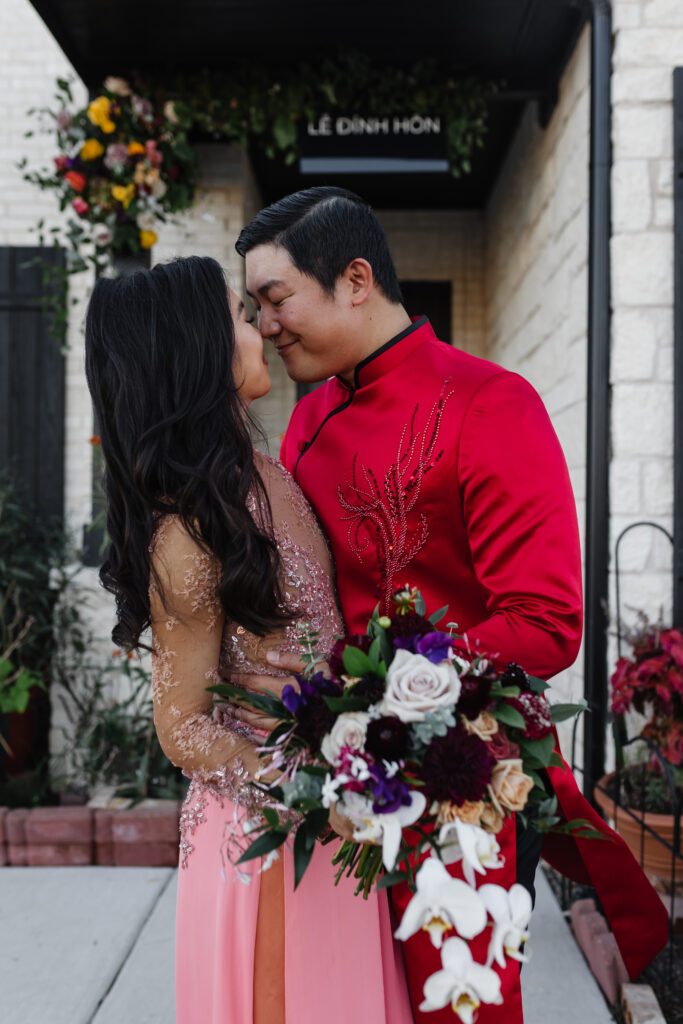
The Preparation
There are a few musthaves when it comes to the Dam Hoi Tradition. The parents will usually choose when to have the Dam Hoi . My Mom looked at a few auspicious dates online. Then, we chose one that lined up with when our wedding florist was available, ha! About four months beforehand, our parents got together to discuss everything that would happen. It’s all a learning experience for us, but since my Mom had the most experience she took the lead. Plus, the Dam Hoi tradition curries favor toward the bride’s family since the groom’s family is the one doing the asking.
Let me warn you, there is a lot of prep work for both parties. This is a great time to get your bridesmaids and groomsmen involved since they will be partaking in the party!
At this meeting, or phone call, between parents it’s crucial to work through:
- How many trays, mam qua, will be needed. Johnny and I decided on six groomsmen and bridesmaids. To keep things a little simpler, my Mom said we could do four or five this time,
- What gifts will go into the mam qua. There are some cultural musts, but it’s really at the bride’s family discretion. For example, some families will bring a roasted pig. Since we’re Buddhist, we opted not to go that route. We chose:
- Fruit
- Betel Leaves (we ended up going the faux route. One of my followers says they are readily available at Indian Grocery stores if you can’t find them elsewhere)
- Wine/Champagne/Cognac
- Taiwanese Engagement Cake – Johnny’s Mom is Taiwanese and per their traditions, the groom’s family is responsible for gifting these to the bride’s family. We wanted to incorporate this and felt like this was a natural way to do so!
- Other gift options include xôi (sticky rice), Bánh Phu Thê (Husband & Wife cake – we’ll be doing this for the wedding!)
- Quantities of these gifts. There should be enough to fill the mam qua, but the groom’s family needs to bring extra! At the end of the Dam Hoi Tradition, the bride’s family will divvy up the gifts. Some will be gifted to the groom’s family and some to other family and friends so they can share in the celebration.
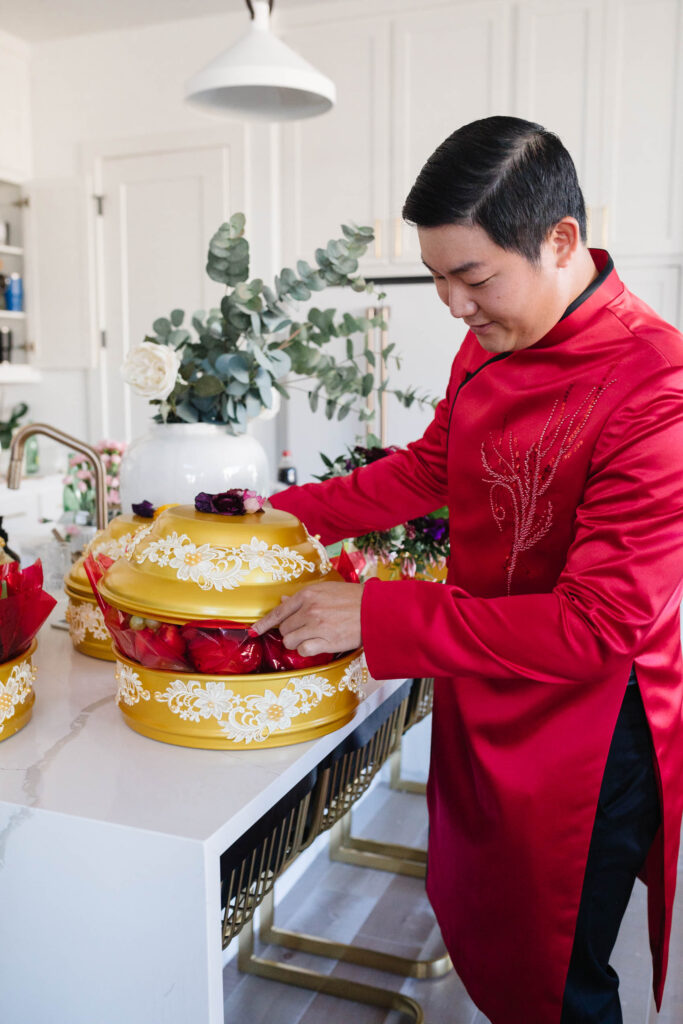
Bride’s Family Responsibilites
As I mentioned before, there is plenty to do! The bride and her family are responsible for hosting the ?ám H?i, so there is quite a big on lift on their end.
- Plan reception menu and beverages (we catered Vietnamese food and hit up Costco for drinks, including our favorite champagne: Veuve Clicquot)
- Clean and tidy up the bride’s parents’ home and decorate for the Dam Hoi (decor details below)
- Prepare the Altar. Since we are Buddhist, we had Buddhist statues and photos of our ancestors. We rented ornate wedding candleholders and incense burners from Houston for this.
- Decide who will receive which mam qua in the procession.
- Choosing an Áo Dài for the bride, her bridesmaids and her Mom to wear. Nowadays, most men will wear a suit, but my Dad wore an Áo Dài, too.
Groom’s Family Responsibilites
- Gather and prepare gifts for the mam qua. Johnny’s Dad actually imported these gold containers from Vietnam. Red is more typical, but I love yellow and gold. Plus, I wanted it to be a bit more unique since we’ll be using these for the wedding day, too!
- Decide which groomsmen will carry which mam qua
- Choosing an Áo Dài for the groom and his groomsmen
All the Decor
There are three must-have decor pieces for the Dam Hoi Tradition. The first is a sign outside the bride’s family home saying, Le Dính Hôn. This can either be above the door or at the entrance to the home. It’s usually adorned with flowers. The first reasoning is so the groom’s family knows which house belongs to the bride’s family. The second is so others in the neighborhood know a celebration is happening. We are two weeks in and my Mom still wants the sign up at her house haha!
The decor was one of the ways we could modernize a few things. We wanted to put our own spin on the Dam Hoi Tradition, but also make sure we were being respectful. I love a good sans serif font and with our home decor, we tend to skew more modern. I ordered this custom sign and asked them to use Montserrat since it’s compatible with Vietnamese. Johnny attached it with trigger clamps so we wouldn’t damage my parents’ house. The clamps are pretty obvious, but I asked our incredible florist to cover them and you’d never know!
The next is a wall of sorts inside. This has the couple’s names, the date and says Le Dinh Hon at the top. Typically this acts as a way to always remember the couple and the occasion. Since my parents’ home is brand new, I didn’t want to risk damaging the walls in case we couldn’t get the vinyl letters off. Johnny built this photo backdrop wall. One of my bridesmaids, Sarah Rose, came over and painted it. Then, one of my other bridesmaids, Danielle, came over with her husband Dylan to apply the letters. We used Monserrat again, but had the vendor squeeze the font a bit so it would fit on one half of the wall!
The Altar
This is the most important decor for the Dam Hoi Tradition! Vietnamese culture is very family oriented and the altar is extremely important. My parents have a Prayer Room in their house. It’s a bit small, but we squeezed people in and made it work! They have two floating shelves, one for Buddha statues and one for photos of our ancestors. Traditionally, these shouldn’t be on the same wall because when you are bowing, it can be confusing who you are actually bowing to. However, for this it worked since everything was all on one wall.
I know it can be overwhelming so here is what must go on the altar regardless of religion:
- Photos of Ancestors
- Fruit tray
- Candlesticks
- Wedding candles (red or gold will work if you can’t find traditional wedding candles)
- Incense holder
- Flowers
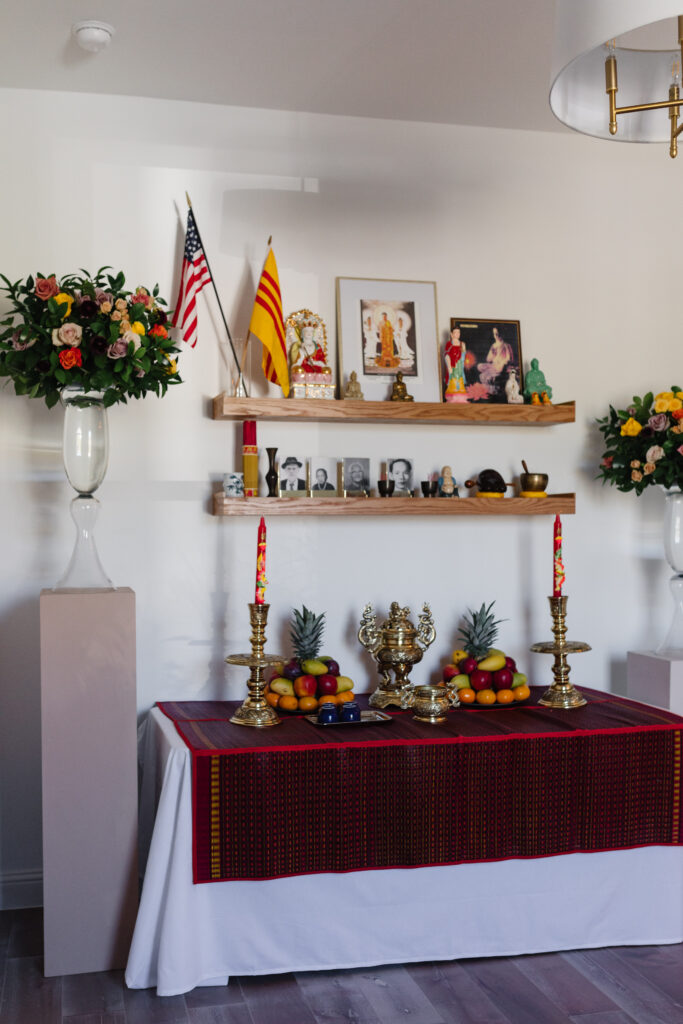
I love these acrylic frames for our grandparents’ photos since they are actually upright instead of leaning back a bit. In addition to the floating shelves, we got a folding table and draped a tablecloth over it. We had four Mam Qua and a tea set coming so we needed as much room as possible. This also meant we needed to get the florals off the table. I rented these columns from The Styled Affair and it was perfect for Something Pretty Floral to put on florals on! The candlesticks, incense holder and burner turned out to be a lot heavier than I expected. I’m so glad we ended up using this table! P.s. don’t forget to fill the incense holder with rice so the incense stays upright!
The Reception
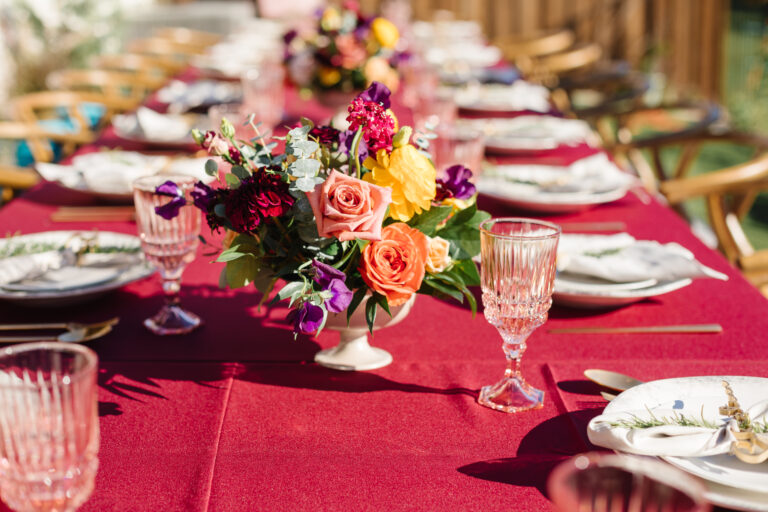
This is where Johnny and I really got to use our imagination! For the Dam Hoi Tradition, the bride’s family is the host. When I asked my Mom if she had any particulars, she said we could do what we want as long as it was a proper sit down meal! Since we had our Dam Hoi in the fall, I wanted rich colors. Plus, I wanted it to blend cohesively with our ao dais. Our wedding has a very neutral and timeless color palette, so I wanted this to be different.
We had some incredible vendors who really took interest in learning about Vietnamese culture and making sure they did everything right, especially Taylor at Something Pretty Floral. I cannot stress enough how wonderful she is to work with. I probably changed the florals around four or five times, but she rolled with the punches and made everything look stunning. Her team is without a doubt so talented!
For rentals, we used Posh Couture and everything turned out so beautifully! At our rentals meeting, I fell in love with this floral plate. I wanted that to really set the tone so went with a ceramic salad/appetizer plate, neutral linen napkin and gold flatware. The pink vintage goblets made my heart flutter when I first saw them and they worked perfectly with the table.
My two Maid of Honors tied the custom place cards to the napkins with a fresh sprig of rosemary. Even though it was a more intimate gathering, I felt it was better to avoid confusion with a seating chart and designated seating.
Finally, we rented these two arches from The Styled Affair and bought this custom neon sign. It was perfect right behind us as the sun started setting in the distance.

Turn on your JavaScript to view content
Wardrobe – The Ao Dai
The Ao Dai is the pride of Vietnamese people. The literal translation means long dress and the ao dai consists of a long tunic with wide-leg pants underneath. Originally loose and plain, it wasn’t until French-trained artists began playing around with the fit, the ao dai became a symbol of beauty and elegance. One of my favorite aspects is how it’s modest and sensual at the same time.
Thai Nguyen Atelier made this custom hand-beaded ao dai for me in 2015. I was Miss Nebraska USA and emceeing an event at the Kennedy Center honoring 40 years of Vietnamese refugees overseas. I remember when he first pulled it out of the bag, I knew I wanted to wear it for my Dam Hoi. We took extra special care of it so it could happen six years later!
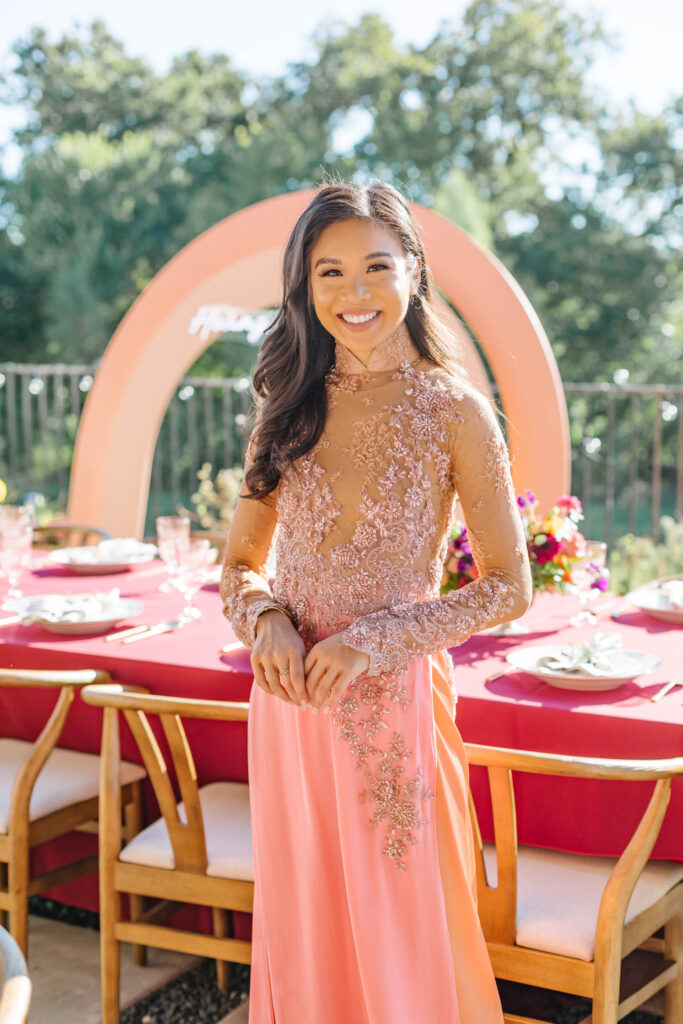
Every time I look at this ao dai, I discover something new. Anh Thai took such special care to perfectly match the beading to the pants, the mesh to my skin color and it fits like a glove. Fortunately, my measurements haven’t changed! I love how the material blows in the wind and steams like a dream! Vietnamese brides typically wear red. Since this is for the Dam Hoi tradition, I wanted it to be a little bit different since it’s not the actual wedding.
Since the ao dai is mesh, I got this tank to wear underneath and it matched my skin color, perfectly! I actually didn’t even have to wear a bra, ha!
In Vietnamese tradition, the bride can also wear a khan dong – a headdress made of rolled fabric. Since there was a lot of silver beading and crystals on my ao dai, this silver one added a bit of contrast, which I love!
Johnny ordered his ao dai online at Lahava. My Mom and I scrolled through a few options and we felt this one not only complemented mine, but would look so dashing on Johnny! They are all custom made and they show you how to take the measurements, too. Johnny wore his favorite black suit pants underneath with black oxfords.
Our bridesmaids and groomsmen lucked out this time around! Since my Dad was the former President of the Vietnamese-American Community of Dallas, I used to put on fashion shows and Vietnamese dances. We had these gold/yellow ao dais in a variety of sizes. My sister altered them as best she could by hand so they would fit my bridesmaids, which I’m so thankful for. We also had a variety of blue and green ao dais for my brother and Johnny’s groomsmen! We requested the guys wear black dress pants, black shoes and bring either a t-shirt or tank to wear underneath.
I think our ladies and gentlemen look so dashing!

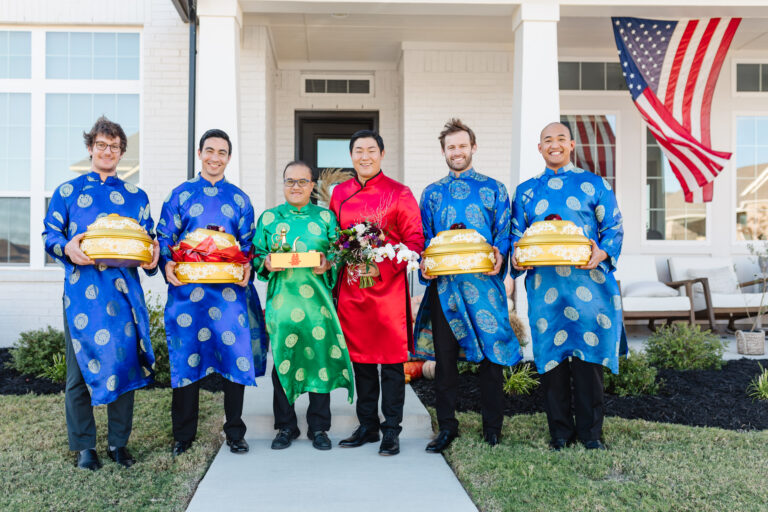
The Ceremony
Once all the gifts are prepared, the groom’s parents, groomsmen and family line up to go to the bride’s house. My Mom told me stories about how in Vietnam many grooms families would walk long distances to the bride’s family carrying the offerings. Luckily, my parents live down street so that wasn’t necessary.
I do want to make note: generally the Dads represent the families and play the lead roles. However, with my Dad’s brain injury and dementia, my Mom represented our family and she did so beautifully!
When the groom’s family arrives the bride’s parents and bridesmaids should be lined up and ready. The groom’s Dad will walk up to the bride’s parents and say he brought the gifts for them for this special occasion. The bridesmaids will then take the trays and bring them inside the house and open the lids. The families are all introduced by the bride’s parents.
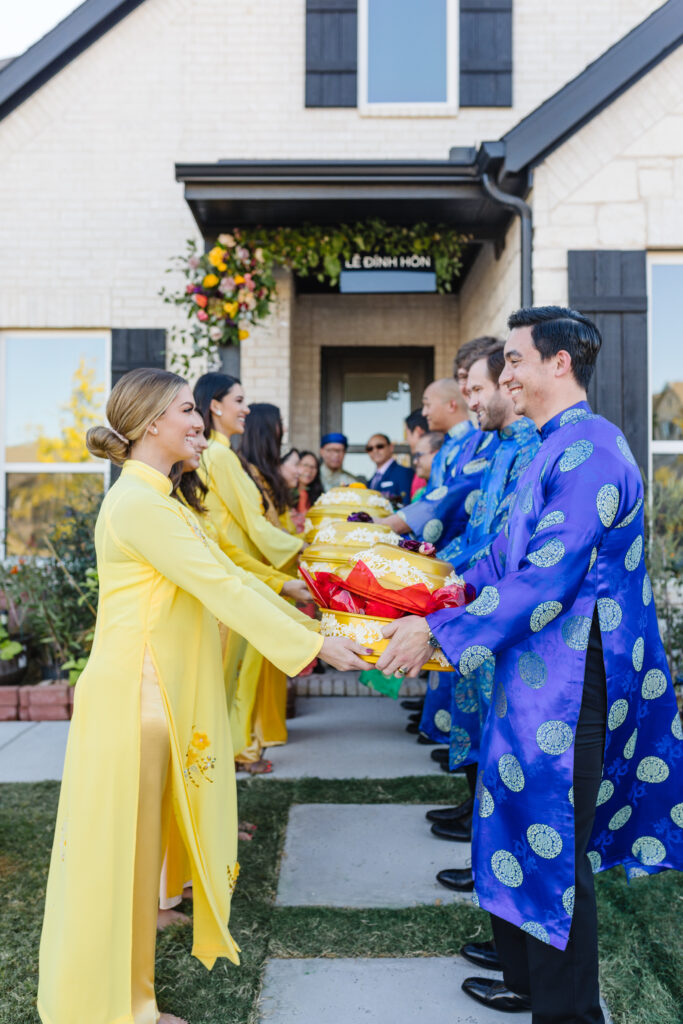
Once inside, the groom’s Dad formally asks the bride’s parents for permission for the marriage. After the bride’s parents accept, the Father, or Mother, of the Bride will bring their daughter and introduce her into the room. Yes, until this moment, the bride is hiding!
The Dads will light the incense and since we’re Buddhist, we say a prayer and ask our ancestors for their blessings. After this, the bride and groom will do the same. Johnny and I poured tea for our parents, thanked them for their sacrifices and bowed to them. This got emotional as I reflected on everything my parents have done for me throughout my life.
Johnny’s Mom presented my family with gifts and gifted me jewelry. Then, Johnny gets down on one knee again (lol no ice this time, much easier!) and gives me my ring.
To wrap up the ceremony, my Mom announced she is excited about our upcoming marriage & shares our wedding date! Traditionally, there is another ceremony that would take place at Johnny’s parents house signifying his family accepting me into their home, but for convenience we rolled right into dinner!

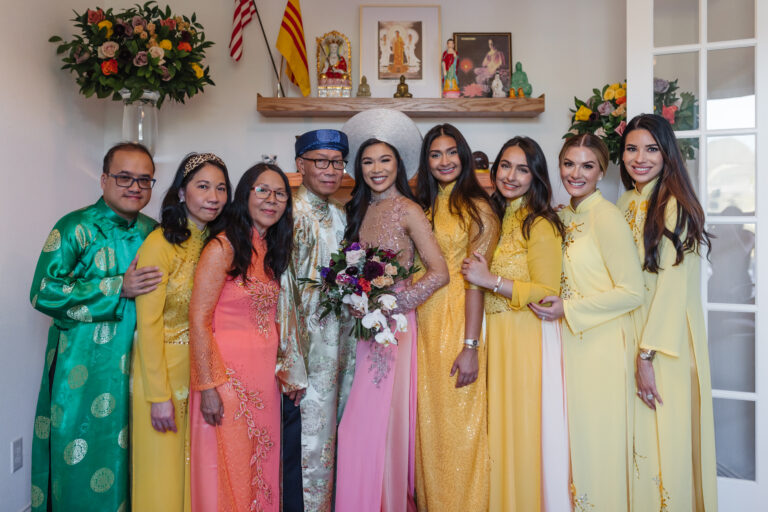
Nordstrom Anniversary Sale 2021 Preview Picks
TOPS & SWEATERS
 JavaScript is currently disabled in this browser. Reactivate it to view this content.
JavaScript is currently disabled in this browser. Reactivate it to view this content.
BOTTOMS
 JavaScript is currently disabled in this browser. Reactivate it to view this content.
JavaScript is currently disabled in this browser. Reactivate it to view this content.
BLAZERS & COATS
 JavaScript is currently disabled in this browser. Reactivate it to view this content.
JavaScript is currently disabled in this browser. Reactivate it to view this content.
ACTIVE
 JavaScript is currently disabled in this browser. Reactivate it to view this content.
JavaScript is currently disabled in this browser. Reactivate it to view this content.
ACCESSORIES & SHOES
 JavaScript is currently disabled in this browser. Reactivate it to view this content.
JavaScript is currently disabled in this browser. Reactivate it to view this content.
BEAUTY
 JavaScript is currently disabled in this browser. Reactivate it to view this content.
JavaScript is currently disabled in this browser. Reactivate it to view this content.

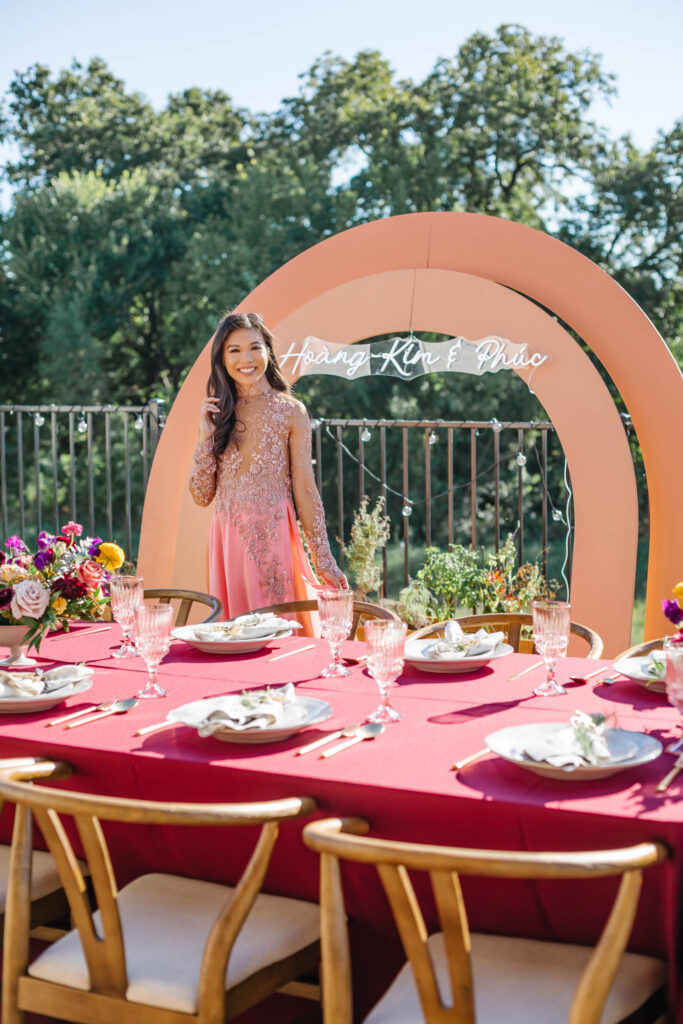
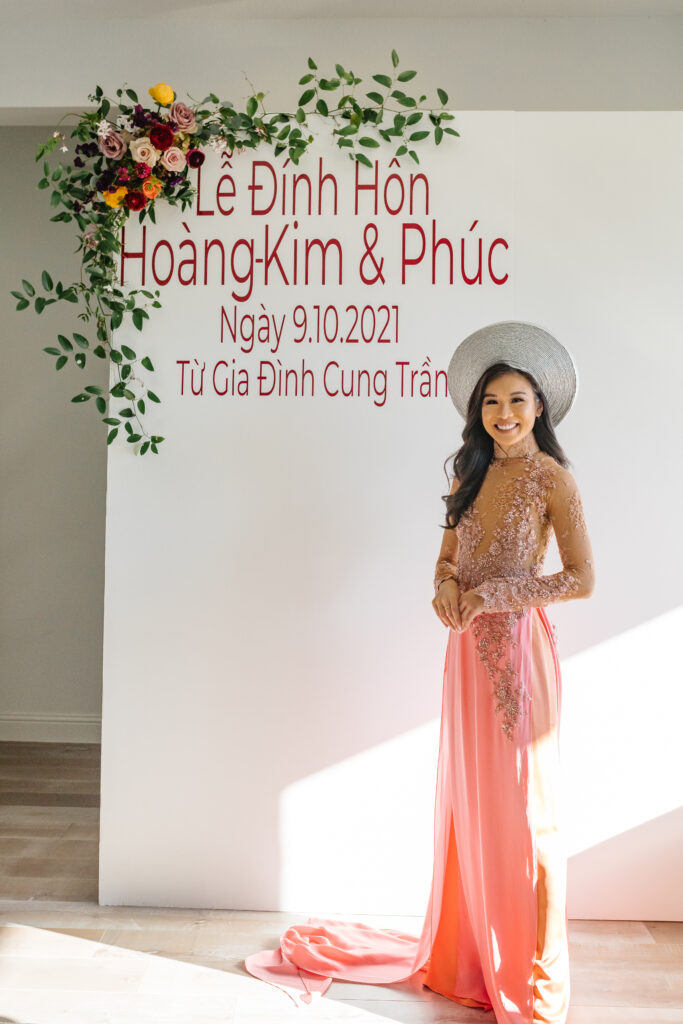
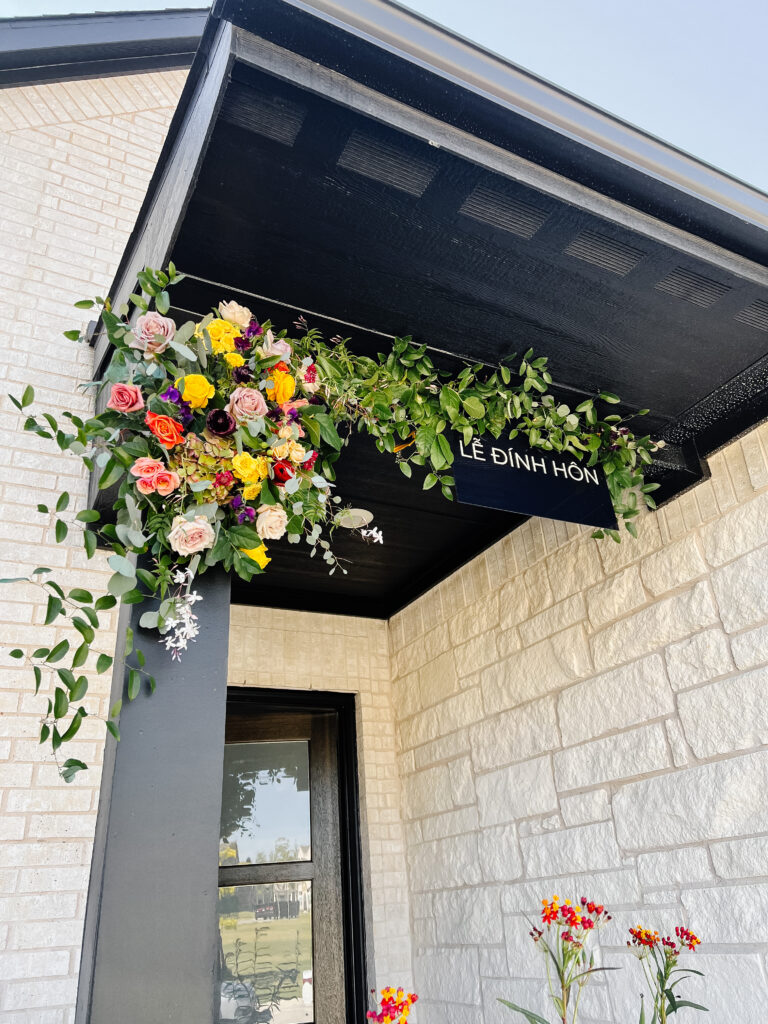
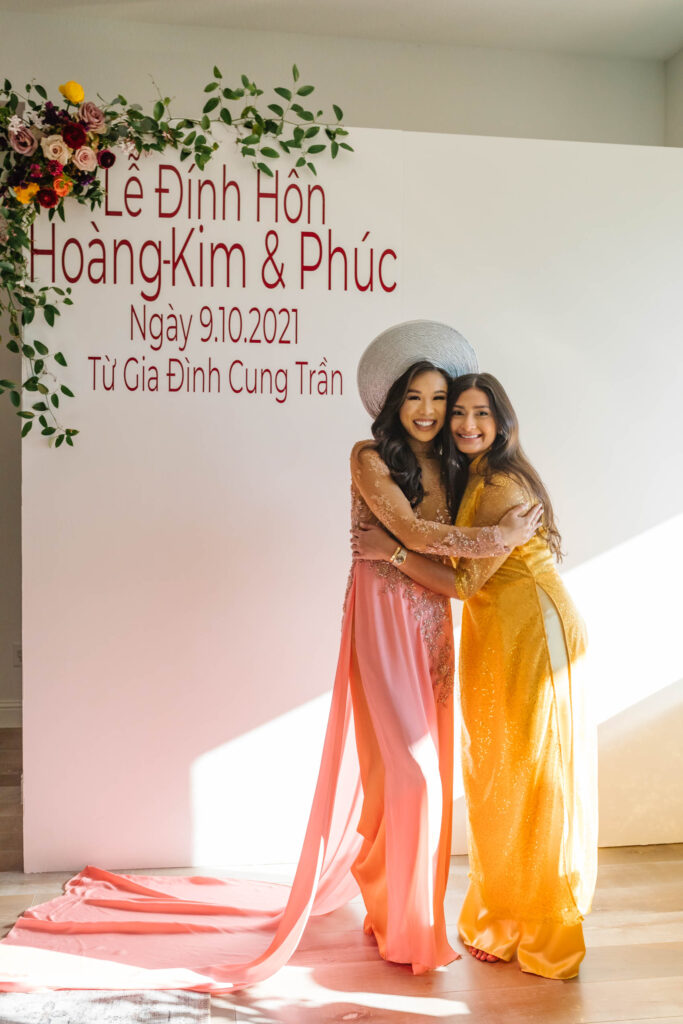
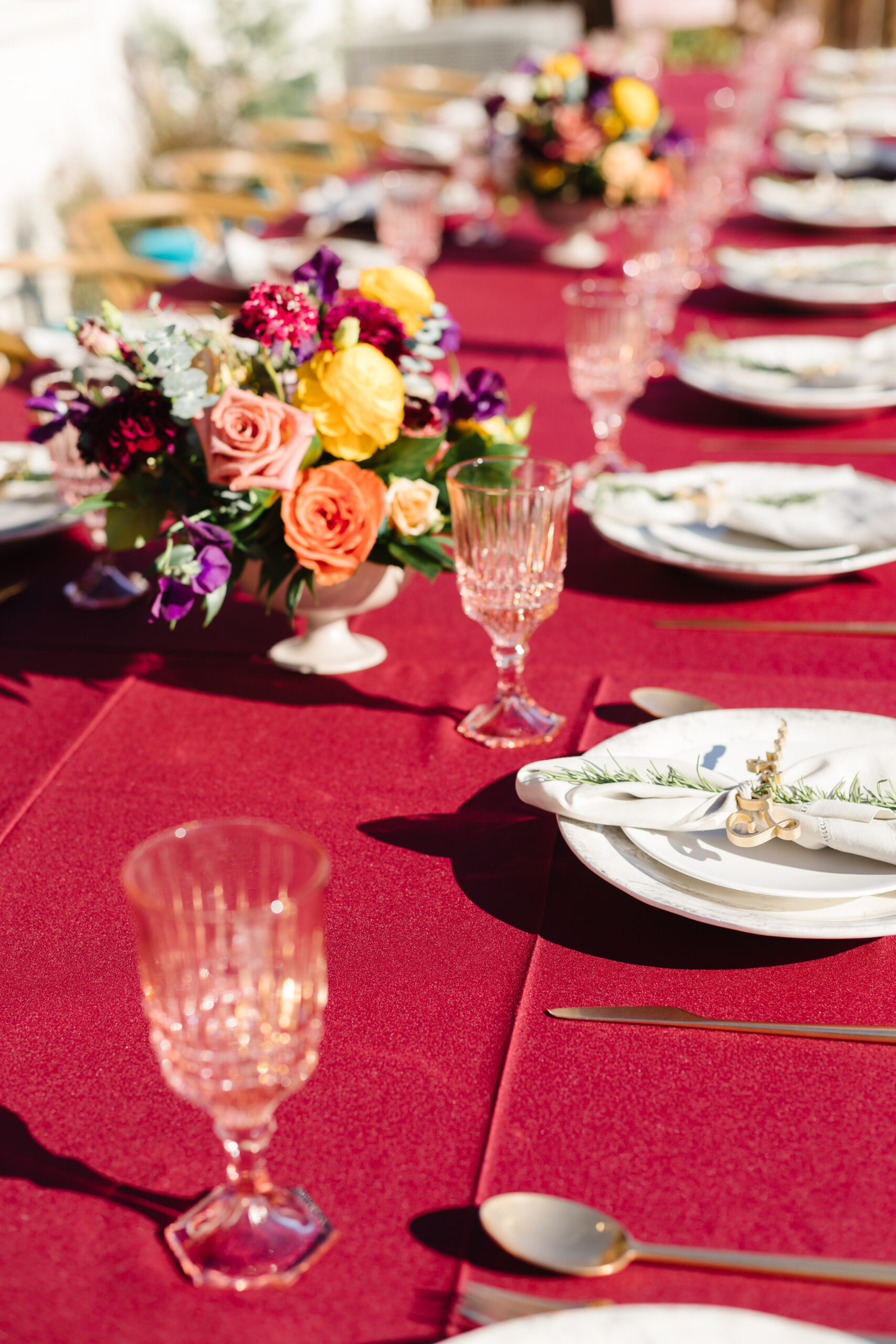
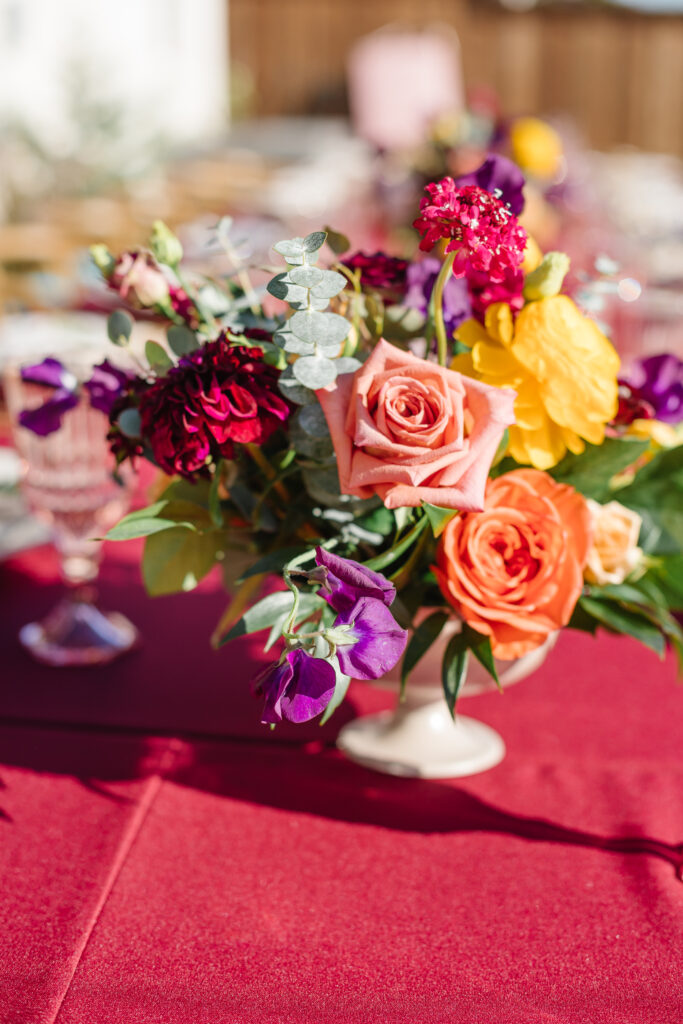
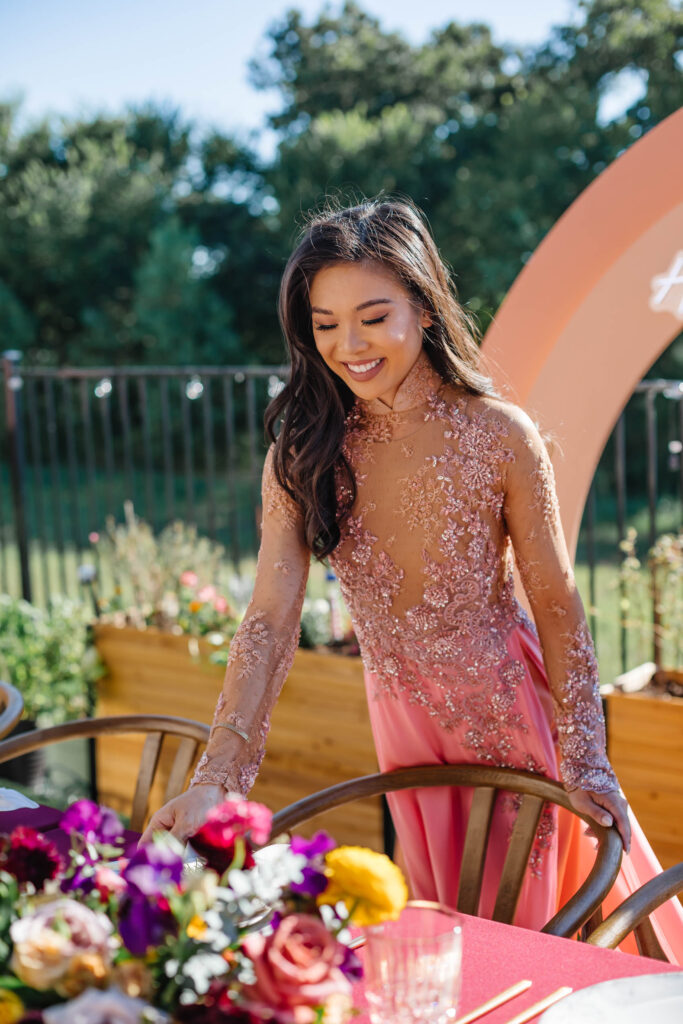
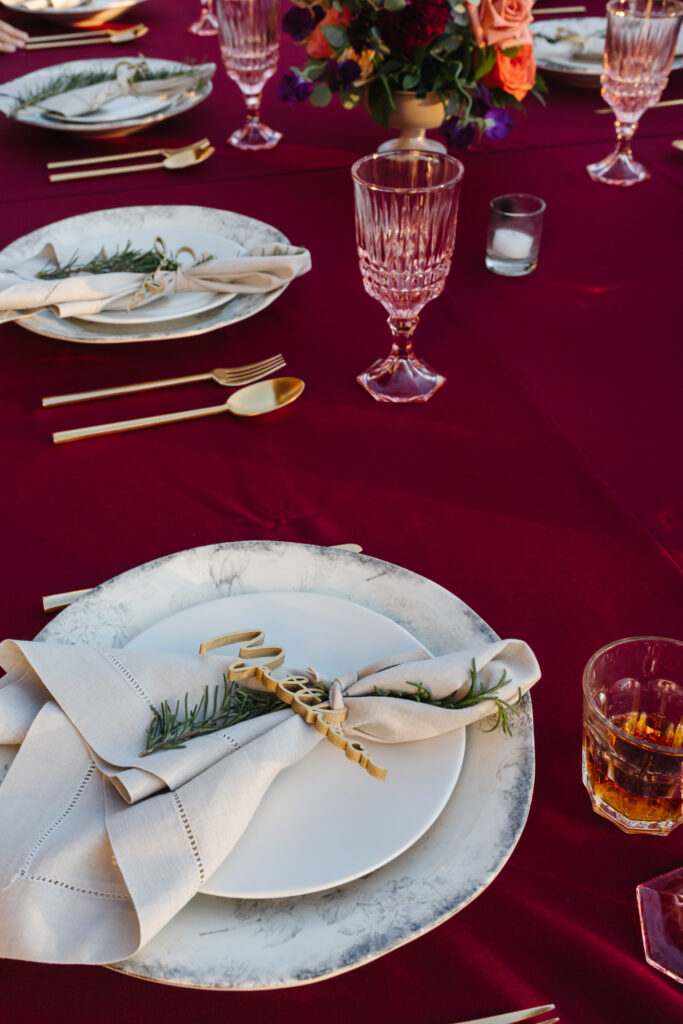

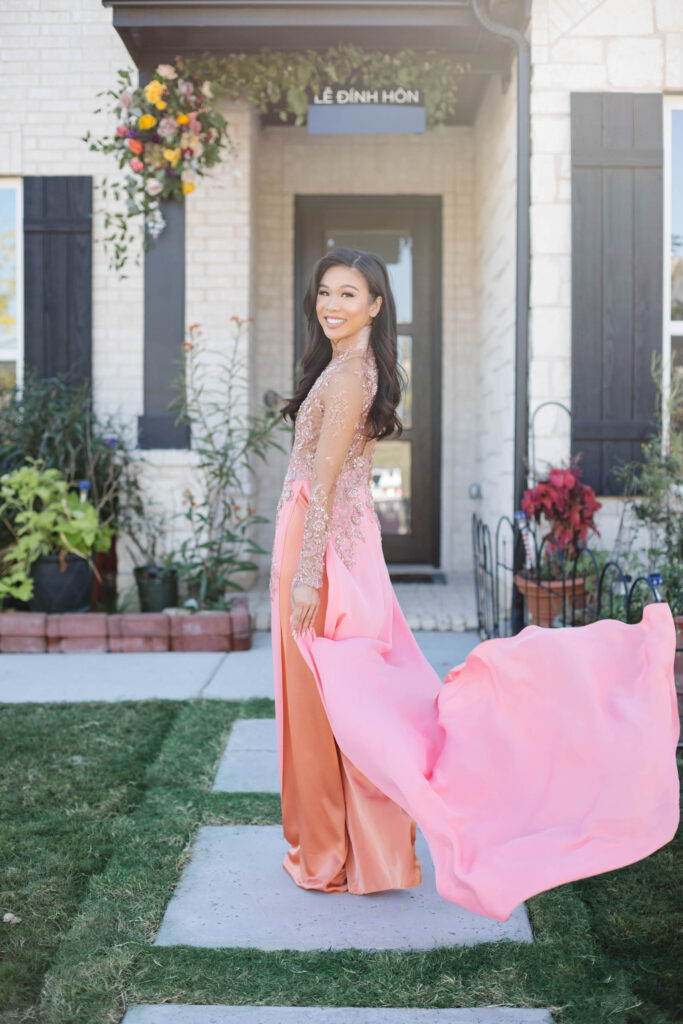
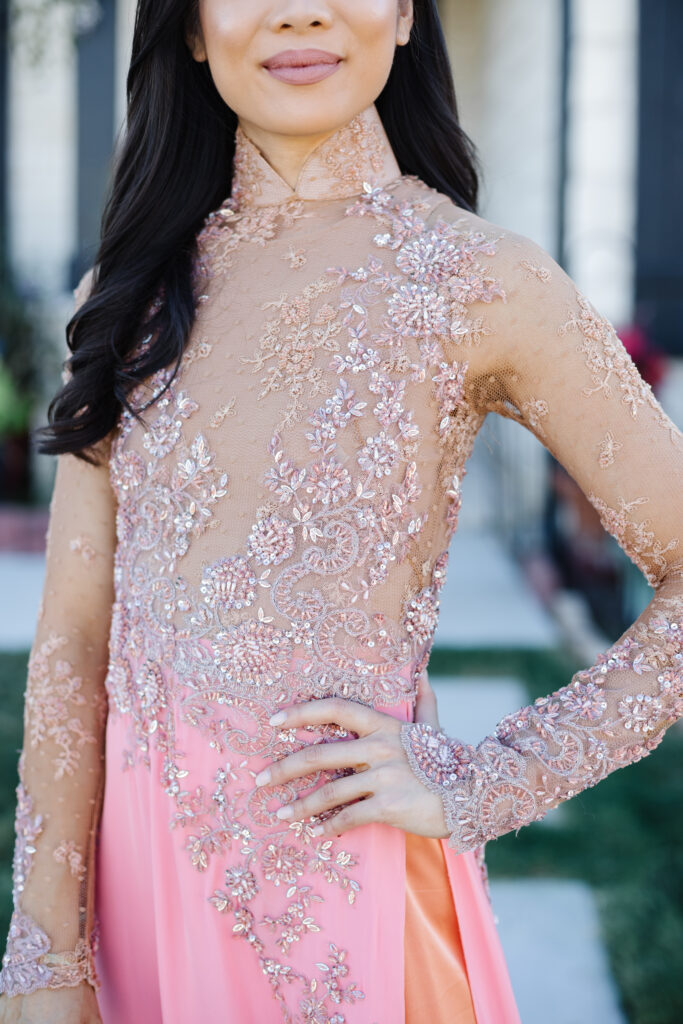
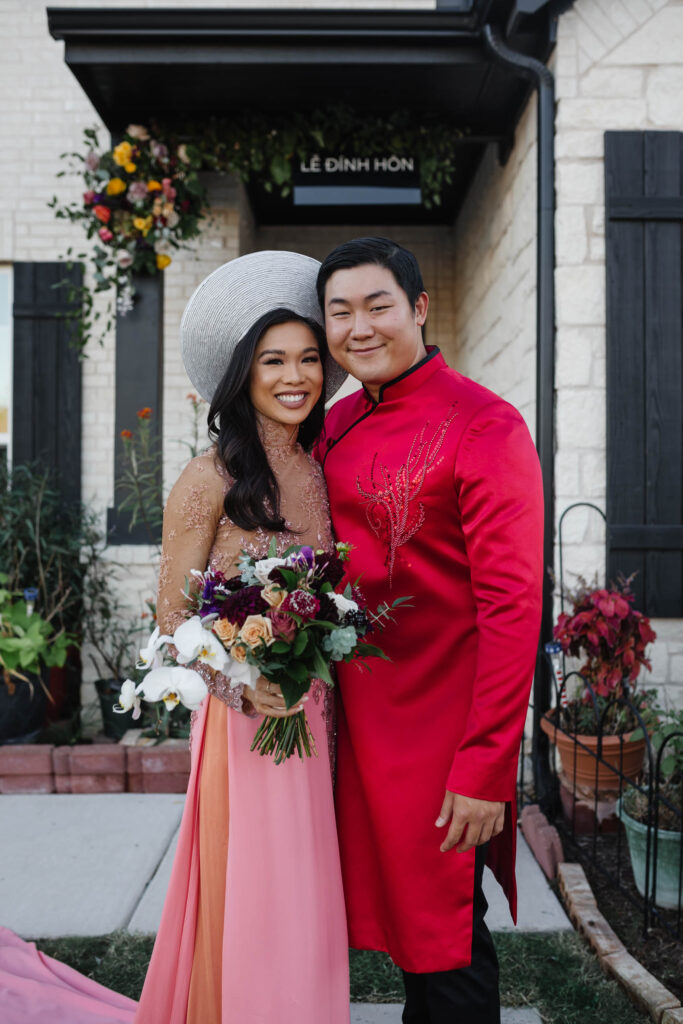
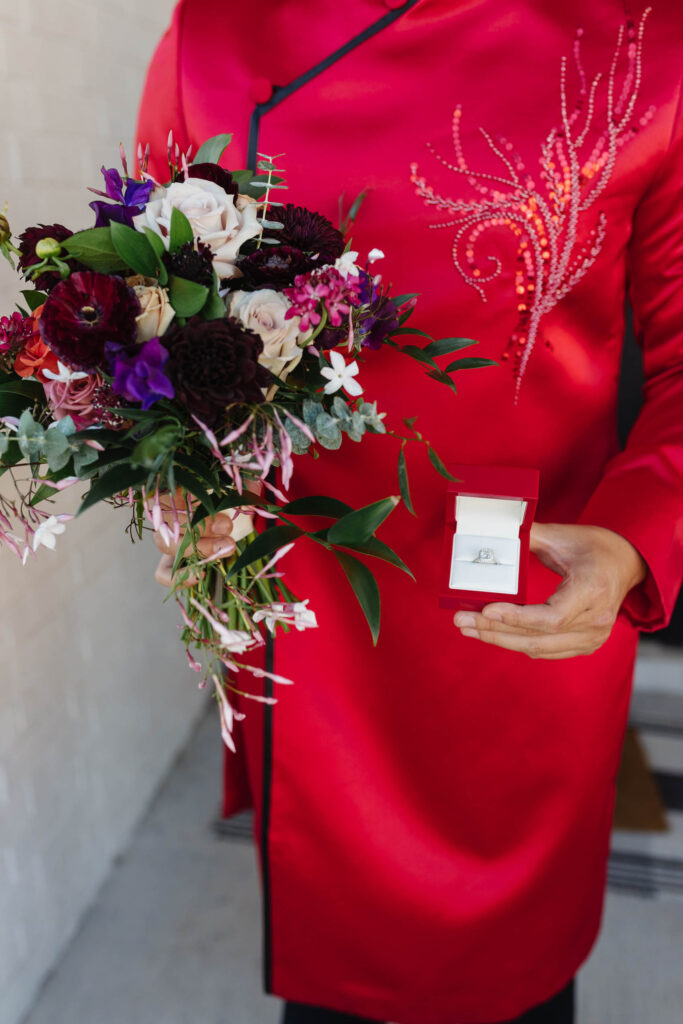
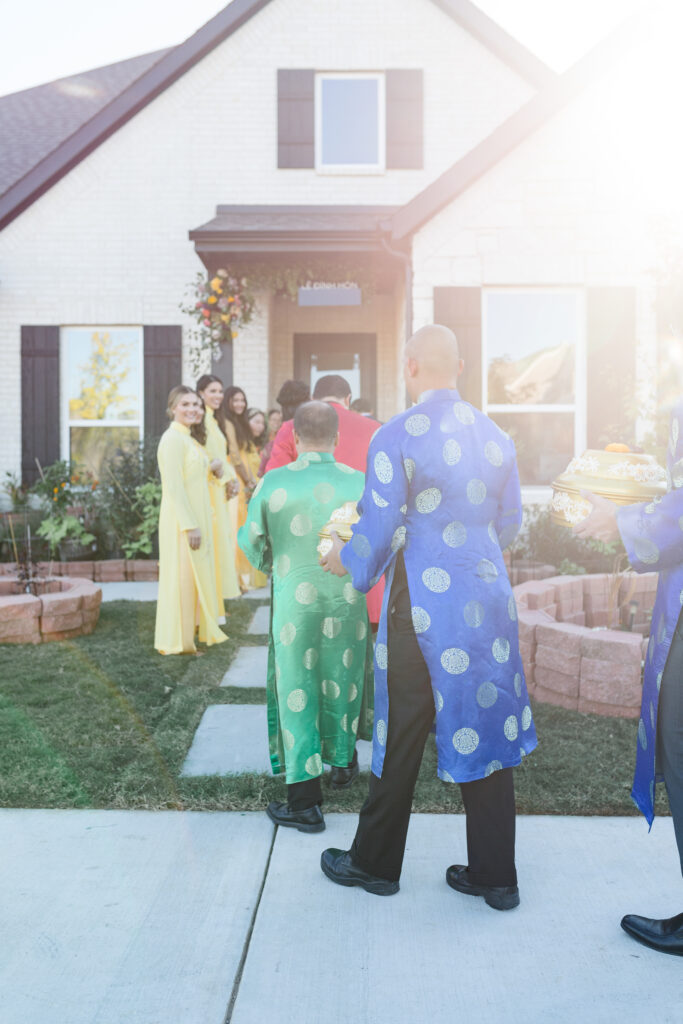
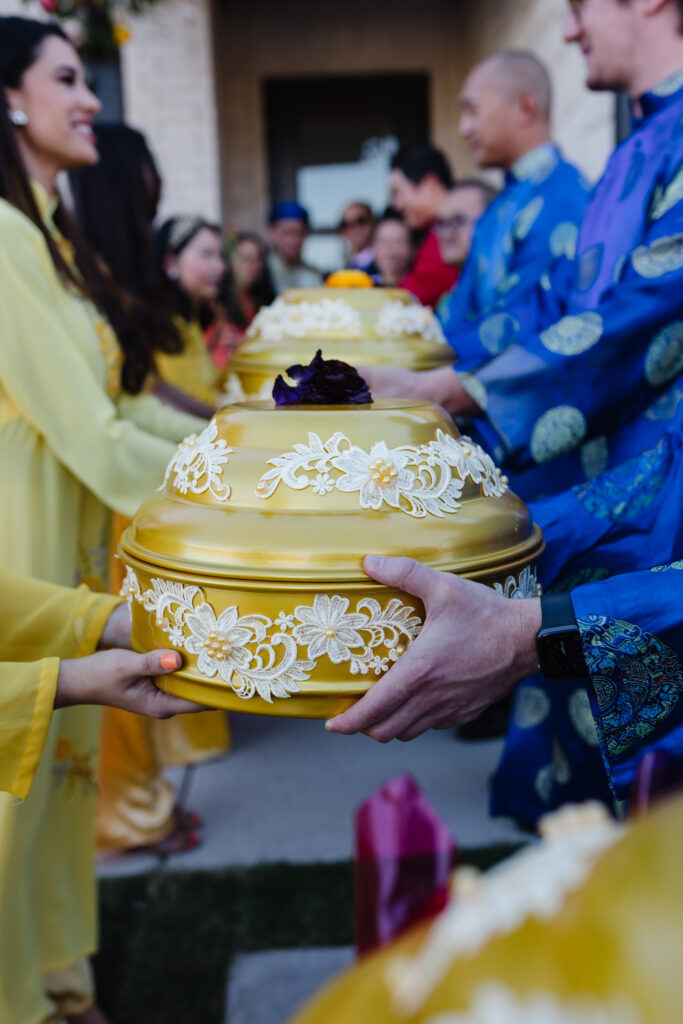
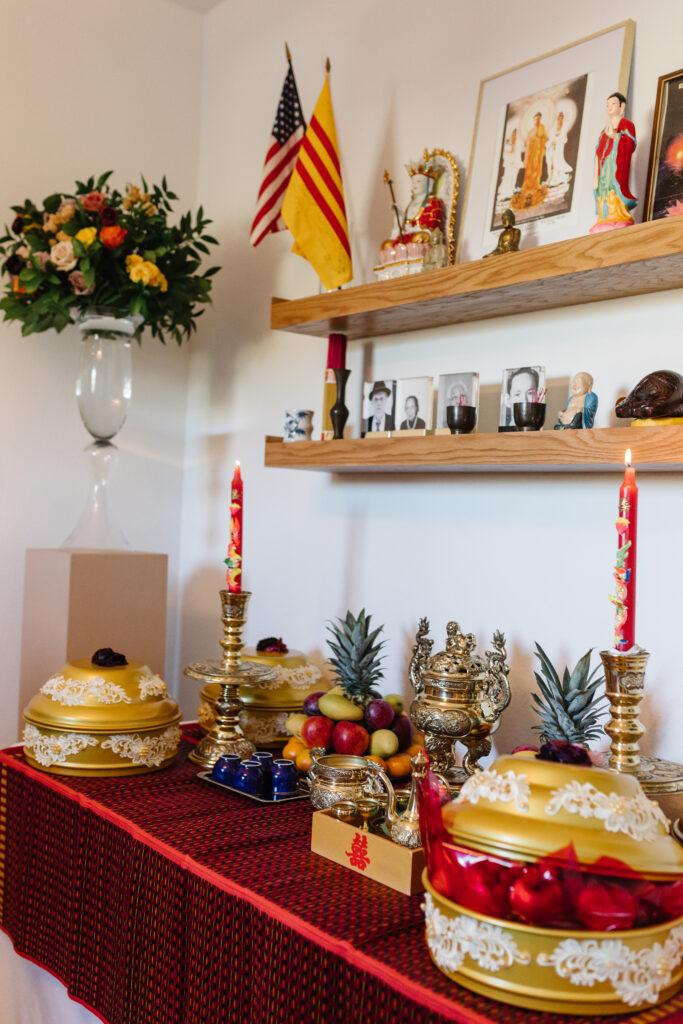
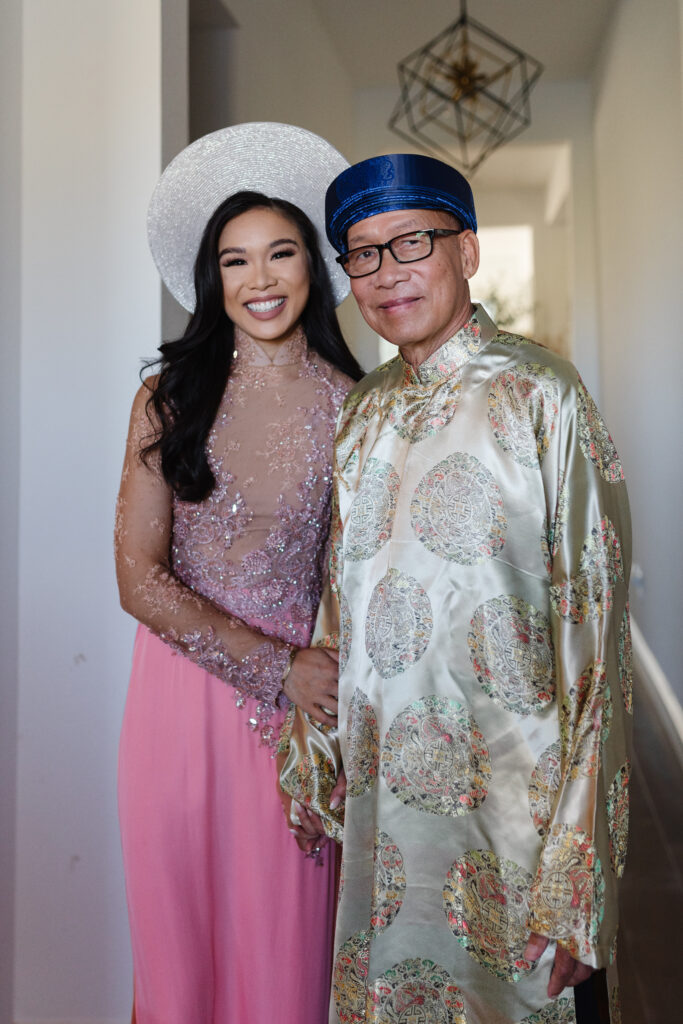
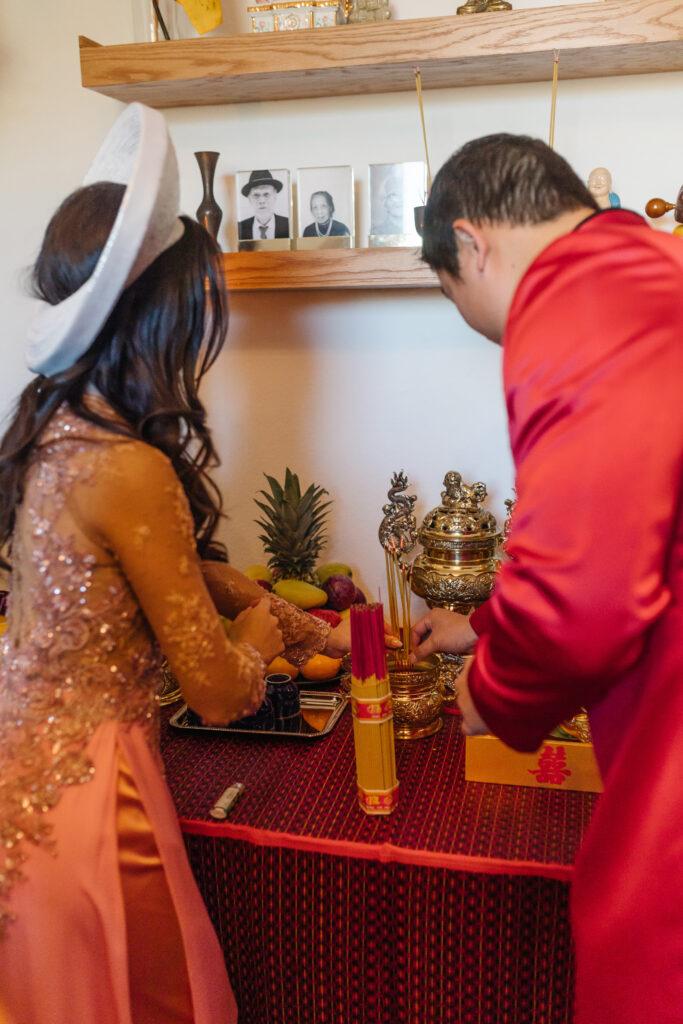
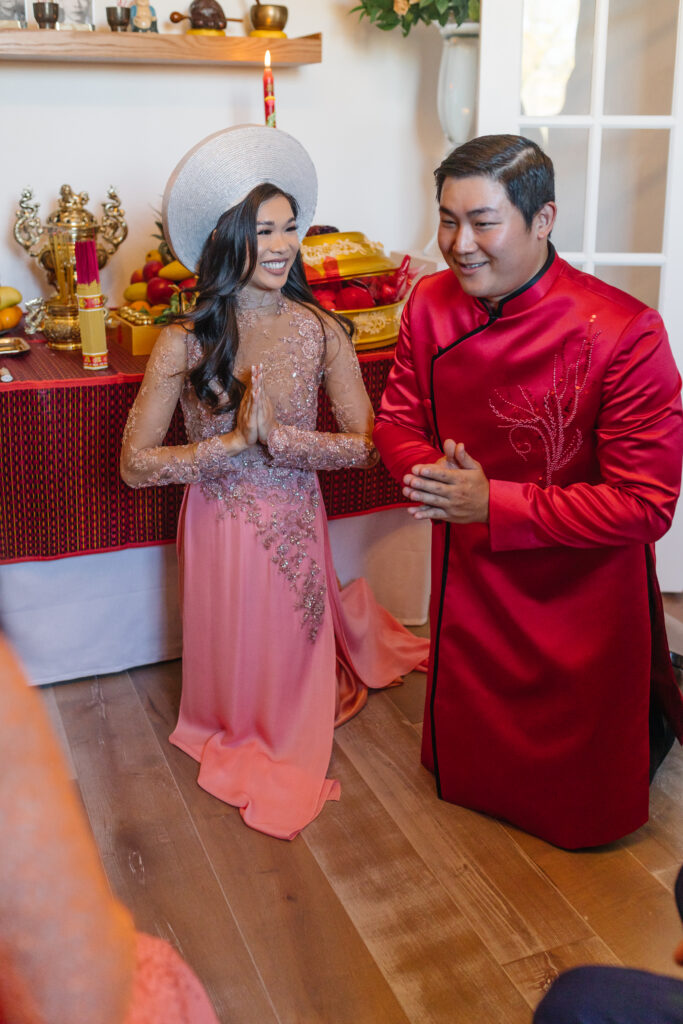
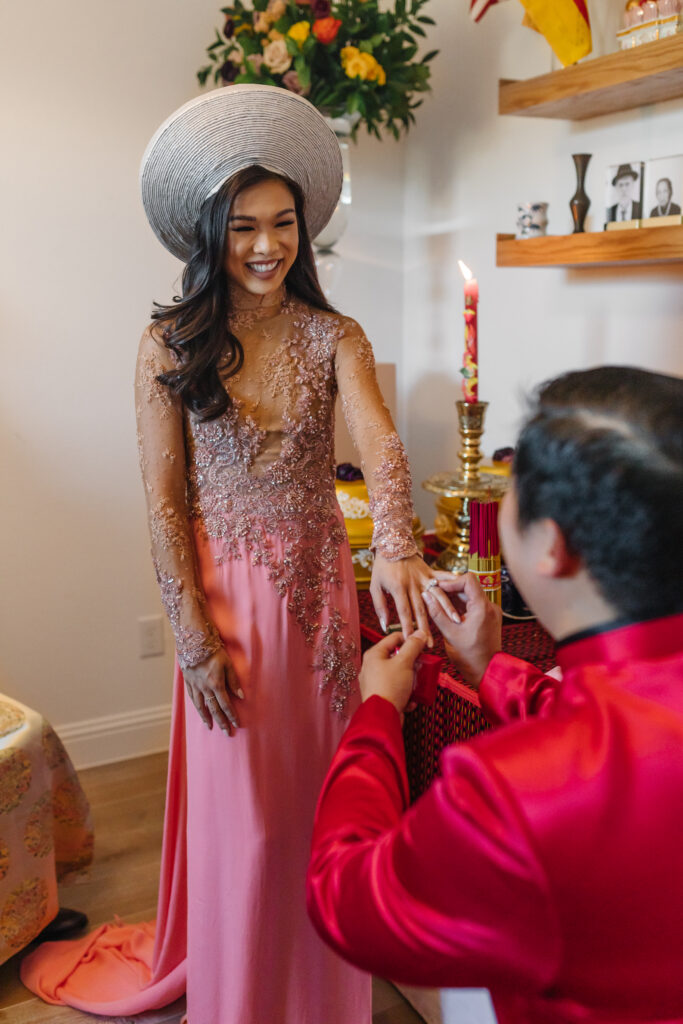














![Toni Kroos là ai? [ sự thật về tiểu sử đầy đủ Toni Kroos ]](https://evbn.org/wp-content/uploads/New-Project-6635-1671934592.jpg)


